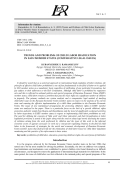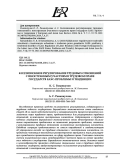It should be noted that as a universal approach to international legal regulation of labor relations, the principle of effective child labor prohibition is one of four fundamentals in the field of labor to be applied by ILO member states on a mandatory basis regardless of ratification of any particular Conventions, but just subject to their adherence to the ILO Constitution. Although child labor is prohibited by regulatory acts and this is reflected in national policies and special programs of Eurasian Economic Union (EAEU) member states, child labor remains a problem that puts the basic rights of a significant number of children in jeopardy. The primary methods are system analysis and a comparative legal method of studying child labor issues in the Eurasian Economic Union member states in respect to the analysis of its current state and ensuring the effective implementation of a child labor prohibition in the Eurasian Economic Union. The issues of new institutional arrangements for protecting children’s rights in EAEU member states are analyzed in the paper. There is a particular focus on the lack of a special children’s rights protection authority (aside from Russia and Kazakhstan) and the trend of significantly weakened activities by labor inspections in EAEU member states in respect to implementing child labor prohibition as well. The need for defining the concepts of ‘light work’ and ‘labor education’ and their formalization in labor legislation provisions is stated in the paper along with the need to adopt legal norms disclosing the nature of relations arising from the work performed by children and the types of this work in the informal economic sector. It appears necessary to work out a concept for regulating relations in the field of child labor in the framework of strategies for the social and economic development of Eurasian Economic Union member states that shall provide for the elimination of child labor based on child labor legislation monitoring and the practice of its enforcement in these states.
Исследование правовых средств коллизионного регулирования, содержащихся в трудовых кодексах государствах Евразийского экономического союза свидетельствует об их явной недостаточности и незавершенности процессов принятия коллизионных норм трудового права, предназначенных для регулирования трудовых отношений, осложненных иностранным элементом. Содержащиеся в трудовых кодексах государств Евразийского экономического союза односторонние коллизионные нормативные предписания не позволяют разрешить проблемы, связанные с регулированием трудовых отношений, осложненных иностранным элементом. Подобная ситуация представляется не совсем оправданной и свидетельствует об упрощенном взгляде на трудовые отношения с иностранным элементом, попрежнему считающем возможным распространение принципов и норм, регулирующих гражданские правоотношения, на сферу трудового права. Учитывая схожесть систем осуществления норм международного частного права на основе гражданских кодексов в государствах Евразийского экономического союза, делается вывод о целесообразности принятия отдельных специальных глав в трудовых кодексах названных государств, предусматривающих коллизионное регулирование трудовых отношений с иностранным участием.

